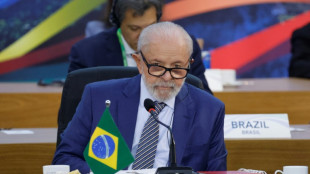
-
 UN General Assembly calls for 'unconditional' Gaza ceasefire
UN General Assembly calls for 'unconditional' Gaza ceasefire
-
Dortmund fear 'worst-case scenario' after Schlotterbeck injury

-
 Juve deepen Man City crisis, Barcelona into Champions League knockouts
Juve deepen Man City crisis, Barcelona into Champions League knockouts
-
'Incredible' Saka makes the difference for Arsenal: Arteta

-
 'We want more', says Olmo with Barcelona bound for knock-outs
'We want more', says Olmo with Barcelona bound for knock-outs
-
Guardiola 'questioning self' after latest City loss at Juve

-
 Nasdaq surges above 20,000 after US inflation data matches estimates
Nasdaq surges above 20,000 after US inflation data matches estimates
-
Torres sinks Dortmund to send Barcelona into knockouts

-
 UN General Assembly calls for 'unconditional' ceasefire in Gaza
UN General Assembly calls for 'unconditional' ceasefire in Gaza
-
US House passes defense bill banning gender care for minors

-
 Turkey says Ethiopia, Somalia reach compromise deal to end feud
Turkey says Ethiopia, Somalia reach compromise deal to end feud
-
Saka brace sinks Monaco as Arsenal eye Champions League last 16

-
 Man City crisis deepens with Champions League defeat at Juventus
Man City crisis deepens with Champions League defeat at Juventus
-
Ashworth exit 'not the best' for Man Utd says Amorim

-
 Romero sorry over Spurs transfer jibe: Postecoglou
Romero sorry over Spurs transfer jibe: Postecoglou
-
Lula to undergo new operation to 'minimize' cranial bleeding risk

-
 New Syria PM says will 'guarantee' all religious groups' rights
New Syria PM says will 'guarantee' all religious groups' rights
-
Wolfsburg earn key win over Roma in Women's Champions League, Lyon net six

-
 Murder rate in Amazon far higher than rest of Brazil: study
Murder rate in Amazon far higher than rest of Brazil: study
-
Malibu wildfire grows as thousands still evacuated

-
 Pachuca down Botafogo in Intercontinental Cup
Pachuca down Botafogo in Intercontinental Cup
-
UN General Assembly to vote on 'unconditional' ceasefire in Gaza

-
 Nine killed in Haiti in latest gang attack
Nine killed in Haiti in latest gang attack
-
US-China officials to hold economic talks before Trump return

-
 Saudi Arabia gave 'assurances' over LGBTQ fans at World Cup: English FA
Saudi Arabia gave 'assurances' over LGBTQ fans at World Cup: English FA
-
Rangers can create magical night against Tottenham, says Clement

-
 Galliano says leaving Maison Margiela after 10 years
Galliano says leaving Maison Margiela after 10 years
-
Stocks mostly rise as US inflation data boosts rate cut hopes

-
 Sundance unveils eclectic lineup for 2025
Sundance unveils eclectic lineup for 2025
-
FIFA confirms Saudi Arabia as 2034 World Cup host

-
 Germany's Scholz urges investment in 'future EU member' Ukraine
Germany's Scholz urges investment in 'future EU member' Ukraine
-
EU conservatives seek to stall 2035 combustion engine ban

-
 2034 World Cup in Saudi Arabia puts lives at risk: rights groups
2034 World Cup in Saudi Arabia puts lives at risk: rights groups
-
Russia vows retaliation after Ukrainian ATACMS strike

-
 Canada central bank makes half point rate cut to 3.25%
Canada central bank makes half point rate cut to 3.25%
-
US consumer inflation accelerates for second straight month in November

-
 Lula alert, 'progressed well' since intracranial surgery
Lula alert, 'progressed well' since intracranial surgery
-
Relatives of Syria's disappeared seek closure in Damascus morgues

-
 Food fight: $25 bn US grocery deal falls apart
Food fight: $25 bn US grocery deal falls apart
-
Google unveils latest AI model, Gemini 2.0

-
 MSF resumes some activities in Haiti's capital
MSF resumes some activities in Haiti's capital
-
NFL announces Berlin game for 2025 season

-
 Apple adds ChatGPT integration in latest software update
Apple adds ChatGPT integration in latest software update
-
US consumer inflation rises for second straight month in November

-
 Afghan refugees minister killed by suicide blast
Afghan refugees minister killed by suicide blast
-
Alisson savours 'perfect' Liverpool return

-
 Crunch time for Saudi-hosted drought, desertification talks
Crunch time for Saudi-hosted drought, desertification talks
-
FIFA to confirm Saudi Arabia as 2034 World Cup hosts

-
 Macron urges release of Georgia protesters in Ivanishvili talks: Elysee
Macron urges release of Georgia protesters in Ivanishvili talks: Elysee
-
France's Macron races to choose new PM


Why does UK lag on 5G mobile connectivity?
By approving a merger of Vodafone and Three in the UK, the country has secured a commitment from the mobile phone operators to invest billions of pounds on 5G connectivity.
The UK ranks 53rd in the world for median download speed, according to connectivity intelligence firm Ookla.
Its mobile network is the least competitive in the G7, second only to Germany, which is Vodafone's main market.
The UK's mobile network is "increasingly comparable to that of smaller economies in Eastern Europe, rather than to its wealthier neighbours in Western and Northern Europe", said Luke Kehoe, European industry analyst at Ookla.
So, how did the UK get left behind in the push for faster mobile connection?
- Huawei ban -
In 2020, Britain banned Chinese giant Huawei, a major supplier of equipment for mobile telephone networks, amid fears over cyber security and intense pressure from Donald Trump during his first US presidency.
The move forced operators to remove the Huawei equipment from 5G networks offering faster download speeds by 2027.
This huge undertaking delayed the rollout of 5G by two years and cost around £2 billion ($2.5 billion), according to government estimates.
British telecoms giant BT has already spent an extra £500 million as a result of the ban.
The fifth-generation successor to 4G technology offers quicker transfers of data.
- Covid impact -
With the Covid pandemic breaking out around the same time as the Huawei ban, operators were forced to focus on fixing home networks rather than their mobile equivalents, slowing down the capacity for wider 5G rollout.
George Elliott, policy and communications director at trade association Mobile UK, said strict pandemic restrictions in the UK impacted also the ability of technicians to go out and build the networks.
- Lack of investment -
The government's target is for all populated areas of the UK to have standalone 5G coverage by 2030.
Estimates suggest "that optimal 5G coverage by 2030 could require up to £34 billion -- far beyond current commitments", said Matt Britzman, an analyst at stockbrokers Hargreaves Lansdown.
Vodafone and Three "have committed to invest £11 billion to create one of Europe's most advanced 5G networks", the pair said Thursday.
One unnamed mobile operator in the sector said it regretted the pressure placed on it by governments to launch 5G before it was fully ready, with operators instead having to rollout a more limited, non-standalone version.
Regulation
Britzman also notes that the rollout of infrastructure in the UK had been slowed by "legal disputes over tower installations and complex planning laws".
Operators cite these regulations, which they say give too much importance to local players, as the number one cause of delays in 5G.
J.Fankhauser--BTB
